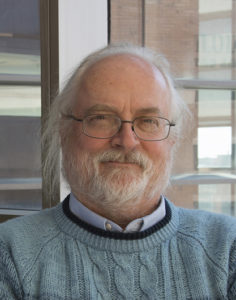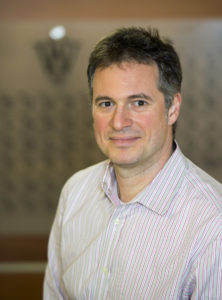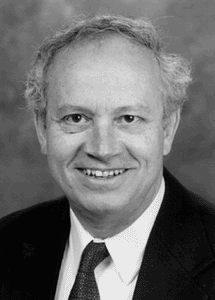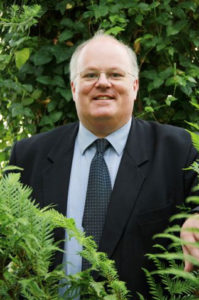Five researchers at Washington University in St. Louis are being honored as outstanding scientists by the Academy of Science-St. Louis.
The faculty members who will receive awards at the April 6 dinner are Stephen Beverley, Liviu Mirica, Kater Murch, Edward Spitznagel and Peter Wyse Jackson.
Each year, the academy seeks nominations of outstanding women and men in science, engineering and technology who are known worldwide for their scientific contributions to research, industry and quality of life. Those recognized also have a record of excellence in communicating with the public or mentoring colleagues.
The awards represent recognition by St. Louis’ scientific community, the academy’s board of trustees and members of the Academy of Science-St. Louis.
Stephen Beverley

Beverley is the Marvin A. Brennecke Professor of Molecular Microbiology and head of molecular microbiology at the School of Medicine. He will receive the Peter H. Raven Lifetime Achieve Award in recognition of his research on the tropical parasite Leishmania, which is spread by the bite of a sandfly and sickens 10 million people worldwide every year.
A world expert on the deadly protozoan, Beverley helped delineate the complicated Leishmania life cycle early in his career, and his studies of the molecular genetics of the parasite have led to new targets for drug treatment and a better understanding of how the parasite evades the immune system. Beverley also has pioneered the use of genetically modified parasites as safe live vaccines and drug-delivery tools.
Recently, Beverley showed that Leishmania parasites that carry a particular virus cause worse disease in people than those that do not, and he has begun investigating methods of eliminating the virus from the parasite as a way to reduce disease symptoms and improve treatment outcomes. He earned a bachelor’s degree in biology from the California Institute of Technology and a doctorate in biochemistry at the University of California, Berkeley.
Liviu Mirica

Mirica, professor of chemistry in Arts & Sciences, will receive the academy’s Innovation Award.
Mirica’s lab develops new organic and inorganic compounds that can be used as catalysts for energy conversion, as well as novel bifunctional compounds that could be used as PET imaging agents for the diagnosis and treatment of Alzheimer’s disease.
Mirica earned a bachelor’s degree in chemistry from Caltech and a doctorate in chemistry from Stanford University. He was then a National Institutes of Health (NIH) postdoctoral fellow at UC Berkeley until he joined Washington University in 2008. He also is the recipient of a National Science Foundation CAREER award, an Alfred P. Sloan Fellowship, and a Ralph E. Powe Junior Faculty Award.
Kater Murch

Murch, assistant professor of physics in Arts & Sciences, also will receive the academy’s Innovation Award.
Murch’s lab uses nano-fabrication techniques to construct artificial atoms from superconducting circuits (qubits) that allow them to probe fundamental questions in quantum mechanics.
Qubits are quantum systems with two distinct states, but, unlike classical bits (0 or 1), qubits can exist in superpositions of both states (0 and 1). Interaction of the qubits with their environment can be deleterious to the quantum properties of the system, but also can be harnessed to control them and to induce desired dynamics.
In studying these systems, Murch hopes to develop new ways of using precision quantum measurement to study novel phases of condensed matter, prepare quantum states, and probe chemical and biological systems.
Murch earned a bachelor’s degree in physics from Reed College, and a master’s and doctorate, also in physics, from UC Berkeley. He is also the recipient of a Sloan Fellowship.
Edward L. Spitznagel Jr.

Spitznagel, a professor of mathematics in Arts & Sciences with a joint appointment in the Division of Biostatistics in the School of Medicine, will receive the academy’s George Engelmann Interdisciplinary Award.
Spitznagel has been a proponent of realistic data analysis for over 50 years and has collaborated with investigators in many different disciplines to make sure their studies pass statistical muster.
Spitznagel has been a collaborator on multiple projects investigating the neurobiology of tinnitus and the impact of different treatment options, including treatment with gabapentin (an anti-epileptic), repetitive transcranial magnetic stimulation, and computer-based brain rehabilitation.
His contributions to the statistical analysis of medical studies have been published in nearly 300 peer-reviewed manuscripts, including four of the five “flagship” English-language medical journals: New England Journal of Medicine; Journal of the American Medical Association; Annals of Internal Medicine; and The Lancet.
Spitznagel earned a bachelor’s degree in science from Xavier University and master’s and doctoral degrees from the University of Chicago. He has been an Honorary Woodrow Wilson Fellow and a National Science Foundation Fellow.
Peter Wyse Jackson

Wyse Jackson, president of the Missouri Botanical Garden and the George Engelmann Professor of Botany in Arts & Sciences, will receive the Science Leadership Award.
As one of the world’s foremost and best-known botanists and plant conservationists, Wyse Jackson has played an influential role in reshaping and leading the international botanic garden community over the past two decades. He has worked extensively with botanic gardens and their network organizations worldwide, helping to establish or develop botanic gardens and other organizations in over 30 countries.
He played a lead role in development and implementation of the Global Strategy for Plant Conservation, adopted by the U.N. Convention on Biological Diversity in 2002, and has been chairman of the Global Partnership for Plant Conservation since 2004. He was co-author of the International Agenda for Botanic Gardens in Conservation, now endorsed by some 500 botanic gardens. He was founding chairman (and currently continues as co-chair) of the World Flora Online Consortium, an organization launched in 2012 to prepare an online flora of the world by 2020.
Wyse Jackson earned bachelor’s and master’s degrees from Trinity College Dublin, where he subsequently got a doctorate for work on the taxonomy of Irish Cruciferae. He is a member of the boards of many botanical, conservation and horticultural organizations around the world.